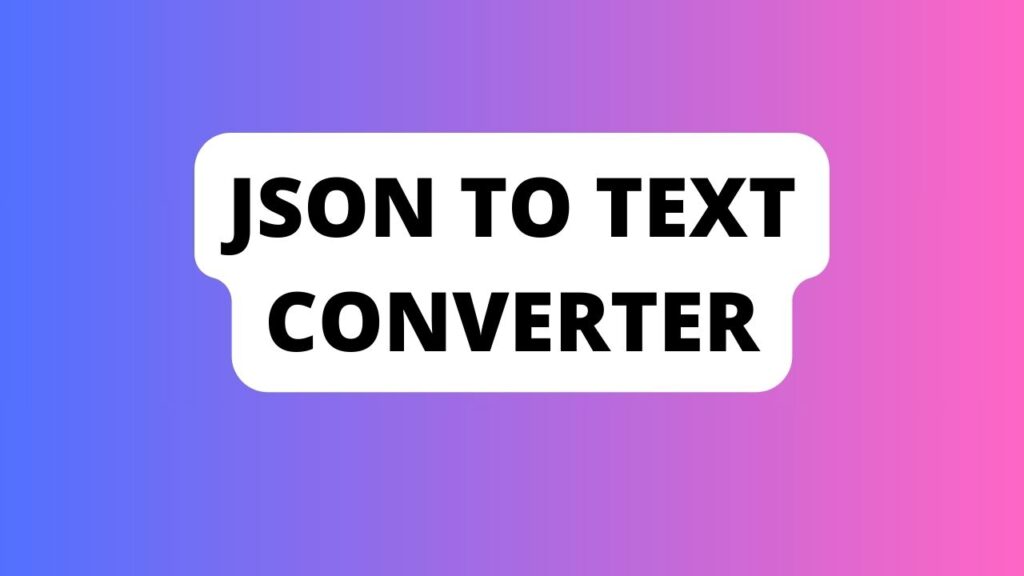Introduction
Json to Text Converter In the digital world, data comes in various formats, and navigating through these diverse data structures can be a challenge. JSON (JavaScript Object Notation) stands out as a flexible and widely used format due to its simplicity and readability. Understanding the intricacies of JSON and its conversion to text is pivotal in data management.
Understanding JSON
JSON serves as a versatile data-interchange format, appreciated for its human-readable structure. Its syntax, resembling JavaScript object notation, simplifies data transmission between servers and web applications. Embraced across diverse industries, it ensures easy parsing and manipulation of data.
What is a JSON to Text Converter?
A JSON to text converter is a tool designed to transform JSON data into a readable text format. It serves as a bridge between the structured, hierarchical JSON data and plain text, allowing seamless interpretation and analysis.
Advantages of Conversion
Converting JSON to text streamlines data handling processes, enabling easier interpretation and analysis. This conversion facilitates quick data transmission and facilitates compatibility with systems that require text-based inputs.
How Does a JSON to Text Converter Work?
These converters operate by parsing the JSON data structure and formatting it into human-readable text. Using algorithms and predefined rules, they interpret complex JSON hierarchies and convert them into simple text formats for ease of understanding.
Popular Conversion Tools
Numerous tools dominate the market, each offering unique features. Tools like “JSON.stringify()” in JavaScript or online converters like “json-csv.com” and “codebeautify.org” simplify this conversion process, catering to different user preferences.
Features to Look for
An efficient converter should maintain data integrity, support various encodings, handle large datasets seamlessly, and provide customization options for output formatting.
Steps to Use a Converter
Using a JSON to text converter typically involves a few simple steps. Users upload their JSON file or input the data, customize the settings if required, and execute the conversion process, obtaining the text output.
Use Cases
JSON to text conversion finds applications in scenarios demanding data extraction or migration. Industries like e-commerce, finance, and software development benefit from these tools to streamline data processing tasks.

Benefits of Using a Converter
The efficiency gained through conversion significantly reduces processing time, simplifies data analysis, and enhances interoperability among various systems.
Limitations
Despite its advantages, conversion may encounter challenges with complex nested structures, loss of formatting in text output, and limitations in handling certain data types.
Comparison with Other Formats
Comparing JSON with XML or CSV formats highlights its superiority in terms of readability, simplicity, and ease of parsing, making it a preferred choice in many applications.
Security Measures
Ensuring data security during conversion is crucial. Implementing encryption techniques and secure connections safeguards sensitive information.
Tips for Efficient Conversion
Optimizing the JSON structure, verifying compatibility with the chosen converter, and regularly updating software versions ensure smooth and error-free conversions.
Industry Applications
Various sectors like healthcare, marketing, and gaming leverage JSON to text conversion for seamless data management, enhancing operational efficiency.
Future Trends
Advancements in technology are anticipated to enhance converters’ capabilities, focusing on faster processing, increased compatibility, and improved handling of complex data structures.
FAQs
Can I convert complex nested JSON structures into text format using these converters? Yes, most converters are equipped to handle complex nested structures, ensuring accurate and readable text output.
Are there limitations in file size when using these converters? Some converters might have limitations on file sizes, so it’s advisable to check the tool’s specifications before use.
Do these converters compromise data integrity during the conversion process? Efficient converters prioritize data integrity and security, minimizing risks during the conversion process.
Is it possible to convert JSON arrays into text using these tools? Yes, JSON arrays can be efficiently converted into text formats using specialized converters.
Are there open-source converters available for JSON to text conversion? Yes, there are several open-source tools available, providing users with free access to JSON to text conversion functionalities.
How frequently should I update my JSON to text converter software? Regular updates ensure compatibility with evolving data structures and security enhancements, hence updating whenever new versions are available is recommended.
Conclusion
In conclusion, the versatility of JSON to text converters significantly simplifies data interpretation, analysis, and transmission across various systems. Understanding their operation, features, and potential applications empowers users to leverage these tools optimally, enhancing data management efficiency.
